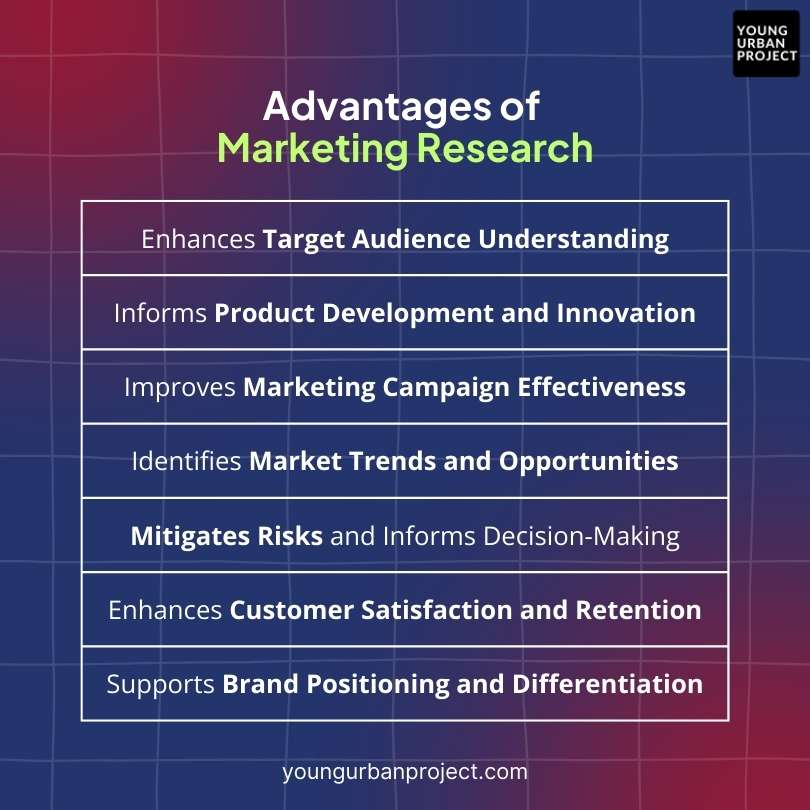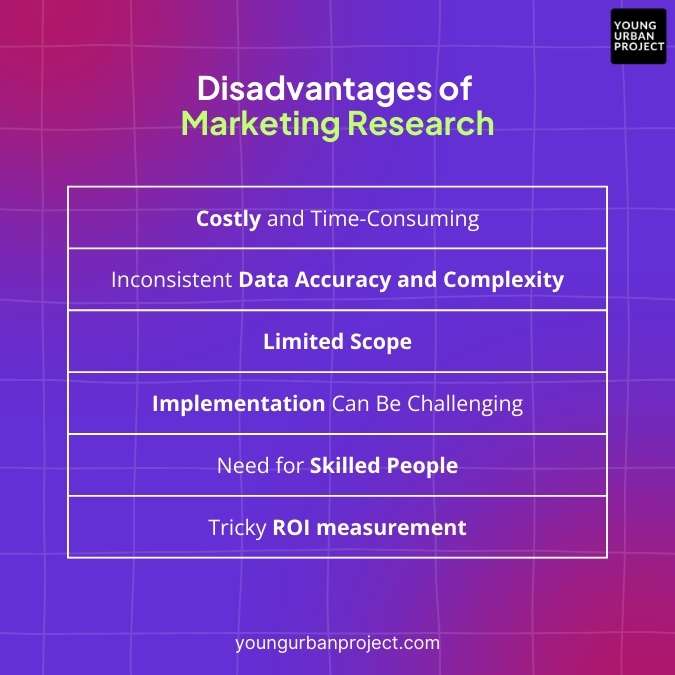If you’re involved in business, you might be familiar with marketing research and its role in understanding target markets. Marketing research involves collecting and analyzing data related to marketing activities, strategies, and the effectiveness of campaigns. While it offers many benefits, like gaining valuable insights and making better decisions, it also comes with challenges.
In this blog post, we’ll look at both the advantages and disadvantages of marketing research to give you a clear view of its impact. Let’s break it down!
Table of Contents
What is Marketing Research?
Before talking about the benefits of marketing research, it’s essential to define what marketing research entails. Marketing research involves the systematic collection, analysis, and interpretation of data related to marketing processes. This research can cover a wide range of topics, including product development, pricing strategies, promotional activities, and customer behavior.
Key components of marketing research include:
- Problem Definition: Identifying the specific marketing challenge or opportunity.
- Data Collection: Gathering relevant data through surveys, interviews, focus groups, or secondary sources.
- Data Analysis: Interpreting the collected data to identify patterns, trends, and insights.
Reporting: Presenting findings in a way that aids decision-making.
Advantages of Marketing Research
Marketing research is a crucial tool for businesses aiming to enhance their strategic decisions and drive growth. By systematically collecting and analyzing data, organizations can enjoy a multitude of benefits that significantly impact their success. Here’s a detailed look at the key benefits of marketing research:

1. Enhances Target Audience Understanding
One of the primary advantages of marketing research is the deep understanding it provides of the target audience. By analyzing data from various marketing channels, businesses can identify which messages resonate most with their audience, what pain points they have, and how to address these effectively.
2. Informs Product Development and Innovation
Marketing research plays a crucial role in product development by identifying consumer needs and preferences. It helps businesses to innovate and create products that align with market demands, reducing the risk of product failure.
3. Improves Marketing Campaign Effectiveness
By understanding which marketing channels and messages are most effective, businesses can optimize their campaigns to increase engagement and conversions. Marketing research helps in determining the best marketing mix, ensuring resources are allocated efficiently.
4. Identifies Market Trends and Opportunities
Marketing research enables businesses to stay ahead of the curve by identifying emerging market trends. This allows companies to capitalize on new opportunities before competitors, ensuring sustained growth and market relevance.
5. Mitigates Risks and Informs Decision-Making
Effective marketing research can significantly reduce the risks associated with launching new products or entering new markets. By providing data-driven insights, it informs strategic decisions, helping businesses avoid costly mistakes.
6. Enhances Customer Satisfaction and Retention
Understanding customer feedback through marketing research allows businesses to improve their products and services continuously. Satisfied customers are more likely to become repeat buyers and brand advocates, which is crucial for long-term business success.
7. Supports Brand Positioning and Differentiation
Marketing research helps businesses understand how their brand is perceived in the market, allowing them to position themselves effectively against competitors. It also identifies unique selling points that can be highlighted in marketing campaigns.
The Disadvantages Of Marketing Research?
Marketing research offers valuable insights but comes with challenges such as being costly and time-consuming, having complexity and a limited scope, and posing a risk of inaccurate data. Additionally, implementation can be challenging, and measuring ROI can be difficult. Here are some disadvantages associated with marketing research:

1. Costly and Time-Consuming
Market research can be quite expensive and time-consuming. For small businesses with limited budgets, paying for surveys, focus groups, and data analysis can be a significant challenge. Gathering and analyzing data requires not just money, but also time, staff, and technology. Finding enough funds for thorough research can be tough, which might limit how detailed and in-depth the research can be.
2. Data Accuracy and Complexity
Marketing research can be tricky because the data might not always be accurate. This can lead to poor decision-making. Additionally, the research process is often complex, making it hard to understand and use the results effectively. Ensuring accurate data and simplifying the analysis are key to getting useful insights.
3. Limited Scope
The scope of Marketing research often focuses on specific aspects of the market, which means it might not capture every detail or emerging trend. This can result in gaps in the information you collect, causing you to miss important developments or shifts. Consequently, the insights you gain may offer only a partial view of the market, potentially limiting your understanding and ability to respond to changes effectively.
4. Implementation Can Be Challenging
Using research results can be difficult. Even if the insights are helpful, making them work in real life often needs extra effort and resources. You might need to adjust your plans, teach your team new skills, or make other changes. There can also be problems like pushback from staff or not having enough resources. These issues can make it hard to put research findings into practice. Planning ahead and getting the right support can help make this easier.
5. Need for Skilled People
Market research requires skilled experts to conduct and interpret the data properly. Many companies opt to hire external firms for this task, but it can be costly. Larger companies may have their own research teams, but setting them up demands significant time and resources, which most small businesses can’t afford.
6. Measuring ROI
Determining the return on investment (ROI) from marketing research can be tricky. It’s often hard to measure how the money spent on research translates into actual business gains. You might struggle to see a direct link between the research and improved profits or performance. This makes it challenging to assess if the research was worth the investment.

Implementing Marketing Research: Best Practices
To fully realize the advantages of marketing research, it’s important to follow best practices:
1. Define Clear Objectives
Before starting any research, clearly define what you want to achieve. Whether it’s understanding customer preferences, gauging campaign effectiveness, or identifying market trends, having specific goals will guide your research process.
2. Use a Mix of Qualitative and Quantitative Methods
Combining qualitative methods (like focus groups and interviews) with quantitative methods (like surveys and analytics) provides a comprehensive view of your marketing performance. This blend of data allows for deeper insights and more informed decision-making.
3. Regularly Update Your Research
Marketing landscapes are constantly evolving, so it’s important to keep your research up-to-date. Regularly conducting marketing research ensures that your strategies remain relevant and effective.
4. Leverage Technology and Tools
There are numerous tools available to aid in marketing research, from Google Analytics to customer feedback platforms like SurveyMonkey. Using these tools can streamline the research process and provide more accurate and actionable insights.
In the end…
Marketing research is invaluable for businesses aiming to optimize their marketing strategies, understand their audience better, and stay competitive in a rapidly changing market. By implementing marketing research effectively, businesses can enhance product development, improve campaign effectiveness, and ultimately drive growth. Whether you’re a product marketer or a marketing student, understanding the advantages of marketing research will equip you with the insights needed to make informed, data-driven decisions.
Investing time and resources into marketing research is not just beneficial—it’s essential for sustained success in today’s dynamic marketplace. Start incorporating these strategies into your marketing plan to stay ahead of the competition and meet your business goals with confidence.
Related:
Significance of Marketing Research
Product Classification In Marketing – Types and Importance
10 Creative Product Launch Ideas For A Successful Launch
Product Marketing Manager (PMM) Role & Responsibilities
How to Use Product Analytics to Optimize Business Strategies
FAQs About Advantages and Disadvantages of Marketing Research
What is marketing research, and how does it differ from market research?
Marketing research focuses on evaluating the effectiveness of marketing strategies, campaigns, and activities to optimize their impact. It examines how well a company’s marketing efforts engage and convert target audiences. Market research, on the other hand, studies market dynamics, customer demographics, and overall market trends to identify opportunities and threats. While both are essential, marketing research specifically aims to enhance marketing performance.
Why is marketing research important for businesses?
Marketing research is crucial because it provides data-driven insights into the effectiveness of marketing strategies. It helps businesses understand their audience better, optimize marketing campaigns, inform product development, and identify market trends. These insights enable companies to make informed decisions, reduce risks, and increase the ROI of their marketing efforts.
How does marketing research enhance target audience understanding?
Marketing research gathers data on how different audience segments respond to marketing messages, channels, and campaigns. This information helps businesses identify which messages resonate with their target audience, what their needs and pain points are, and how to tailor marketing efforts to better connect with and convert these audiences.
What are some common methods used in marketing research?
Common methods include surveys, focus groups, interviews, customer feedback analysis, A/B testing, social media monitoring, and data analytics. These methods help gather both qualitative and quantitative data to assess the effectiveness of marketing strategies and identify areas for improvement.
Can you give an example of how a digital product company uses marketing research?
Adobe Creative Cloud uses marketing research to understand the needs of its users—graphic designers, video editors, and content creators. By analyzing feedback and usage patterns, Adobe can introduce new features or tools that align with user needs, ensuring the product remains competitive and valuable.
How does marketing research support product development?
Marketing research identifies consumer needs, preferences, and pain points, which are crucial for developing products that meet market demands. By understanding what customers want, businesses can design products that are more likely to succeed, reducing the risk of product failure and increasing customer satisfaction.
What role does marketing research play in improving marketing campaigns?
Marketing research provides insights into which campaigns, channels, and messages are most effective in engaging the target audience. By analyzing this data, businesses can optimize their campaigns, allocate resources more efficiently, and increase conversions, leading to a higher ROI.
How can small businesses benefit from marketing research?
Small businesses can use marketing research to understand their target audience, identify effective marketing channels, and optimize their limited resources. This helps them compete more effectively with larger companies by ensuring their marketing efforts are focused and impactful.
What are the risks of not conducting marketing research?
Without marketing research, businesses risk launching ineffective marketing campaigns, developing products that do not meet customer needs, and missing out on emerging market trends. This can lead to wasted resources, reduced ROI, and a decline in competitive advantage.
How often should businesses conduct marketing research?
Marketing research should be an ongoing process, with regular updates to keep up with changing market dynamics and consumer behavior. The frequency depends on the business’s needs, but conducting research at least quarterly or before launching new products or campaigns is recommended to ensure strategies remain relevant and effective.

